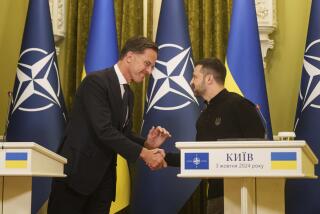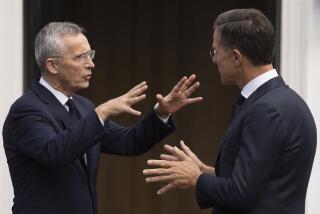CRISIS IN THE KREMLIN : NATO Takes Hard Line With Soviets : Europe: Despite the collapse of the hard-line coup, the Western alliance issues a blunt communique.
- Share via
BRUSSELS — NATO foreign ministers took a tough line Wednesday with the Soviet Union, despite the collapse of the hard-line coup in Moscow and the reinstatement of President Mikhail S. Gorbachev.
Vowing to resist military aggression against any of Moscow’s former satellites in Eastern Europe, the North Atlantic Treaty Organization issued an unusually blunt communique after an emergency meeting that was called in the darkest moments of the Soviet coup attempt but was held as events were turning strongly against the junta.
Most European foreign ministers declared the Gorbachev ouster attempt a failure. Secretary of State James A. Baker III, with characteristic caution, declined to go quite that far.
“If this coup indeed fails, it will be because the fundamental principle that this alliance has supported for more than 40 years has planted itself fully in the soil of our former adversary,” Baker told a press conference after the two-hour meeting.
He later conferred by telephone with Soviet Foreign Minister Alexander A. Bessmertnykh and former Gorbachev adviser Alexander N. Yakovlev. It was the first time since the coup that Baker had been able to reach Bessmertnykh, despite repeated attempts.
In another high-profile demonstration of U.S. backing for Russian Federation President Boris N. Yeltsin, Baker also conferred in person with Andrei V. Kozyrev, the foreign minister in the Russian Federation government.
Kozyrev told reporters that he urged Baker and the West to remain vigilant and to continue opposing the Soviet coup, saying: “It is not time for euphoria. We have won probably the battle, but that doesn’t mean that the reactionaries will not try to retaliate. . . . “
In the communique, NATO foreign ministers demanded “the immediate restoration of President Gorbachev to his rightful office and the renewal of the process of political and economic reform in the Soviet Union.” The ministers indicated that they were prepared, if necessary, to extend NATO’s security shield to Czechoslovakia, Hungary, Poland, Bulgaria and other democratizing nations in Central and Eastern Europe.
Although NATO Secretary General Manfred Woerner said there was no plan to offer membership in the alliance to the former members of the Warsaw Pact, the ministers promised to “develop ways of further strengthening our contribution toward the political and economic reform process within these countries.”
British Foreign Secretary Douglas Hurd described the communique as “a historical document,” a statement of action NATO would have taken if the coup had not collapsed.
As such, it was clearly easier for the ministers to adopt than it would have been if forceful action had been required.
For the most part, the NATO meeting was a victory celebration. While crediting the Soviet public with the most important role in reversing the coup, the NATO ministers insisted that they, too, deserved some praise.
“International opinion is important--not decisive, but influential,” said British Foreign Secretary Douglas Hurd, adding: “The effective institutions of power in the Soviet Union--(the Communist) Party, KGB and Red Army--are pretty much eroded.”
Meanwhile, Baker defended Western response to earlier signs of Soviet unrest. in the Soviet Union. He said the United States and its allies “did heed the warning” of Soviet Foreign Minister Eduard A. Shevardnadze last December that the Soviet Union was headed for a possible military takeover. Asked if there were things “that, in retrospect, he wished the West had done to support Gorbachev, Baker said: “None.”
Other global responses to Wednesday’s Soviet events included:
“We have supported them politically and diplomatically and, I would say, economically,” Baker said. But he added, “You’re not going to see the Soviet Union succeed on the basis of check-writing by others.”
Despite the stern tone of the NATO communique, Baker said the foreign ministers did not discuss possible military measures to reverse the coup. He said the NATO response was a demonstration of the new political focus of the alliance.
More to Read
Sign up for Essential California
The most important California stories and recommendations in your inbox every morning.
You may occasionally receive promotional content from the Los Angeles Times.













